- Home
- John Bellairs
Eyes of the Killer Robot Page 2
Eyes of the Killer Robot Read online
Page 2
"Hey!" Johnny exclaimed as he reached out and grabbed Fergie's arm. "Hey, Fergie! Over there!"
Fergie looked, and he smiled sourly. Johnny had told him the professor's story, and Fergie had not believed one word of it. Fergie was a pretty skeptical kid, and he was always making fun of Johnny for being gullible. "Yeah, I see it," he muttered in a bored voice. "I've seen the place before—I live around here, remember? An' I have heard everything that I want to hear about the guy with the electric whizmagiggy, or whatever it was. C'mon, I'll race you to the bottom o' this hill."
"Can't we just go over there and poke around for a minute?" asked Johnny plaintively. "It'd only take a minute or two."
Fergie gave Johnny an irritated glance, but then he grinned and shrugged. "Oh, well, why not?" he said carelessly. "We haven't got anything better to do. Let's go."
The two of them left the road, plodded up a short steep bank, and clambered over a sagging wire fence. As they tramped across the dry stubble, clouds of midges hovered about them. The long level rays of the setting sun fell on the splintered wood of the old grandstand and the weedy overgrown baseball diamond. It occurred to Johnny that this was the same time of day that it had been when he and the professor had been here. Maybe I was meant to come here again, he thought. This was a weird idea, and he would never have spoken it out loud. But he believed in things that were "meant to be," no matter how hard he tried not to.
For a while Johnny and Fergie just fooled around. Fergie had a small rubber ball in his pocket, and Johnny found a fairly straight branch in a pile of dry brush by the roadside, so they were able to play stickball. But Johnny had trouble seeing the ball in the fading light, and after a little while they just went over to the grandstand, sat down, and drank from the canteen of water they had brought with them. In the hollow space under the sagging roof, shadows were gathering. The sun was gone now, and a faint orange afterglow hung in the sky. Johnny fell into a thoughtful mood. He had the odd feeling that something was going to happen, though he didn't have any idea of what it might be. Suddenly he was startled by a sound that seemed to come from inside the grandstand.
"Huh?" he said, glancing quickly over his shoulder. "Did you hear that? What was it?"
Fergie snickered. "It was the mullygrubs. They're comin' to carry us off an' turn us into Baby Ruth candy bars. What a horrible fate for two innocent youngsters like us."
Johnny gave Fergie a dirty look. "You think I'm just a nervous nit, don't you?" he grumbled.
"Yeah, I do," said Fergie cheerfully as he scrambled to his feet. "Tell ya what, John baby. I'm gonna run down to that bent-over tree an' back an' you can time me with your watch. Then we're gonna have to hit the road; it's gettin' dark. Ready? Here I go!"
Johnny opened his mouth to say that he couldn't read his watch face in the darkness under the grandstand roof. But it was no use: Fergie was off like a cannon shot, elbows and knees pumping madly. With a sigh, Johnny sank back into his seat. He sat very still watching his friend run, and then a strange feeling began to steal over him. He felt cold and alone, as if he were the last person left on the face of the earth. Gripping his knees hard with his hands, he stared rigidly ahead, and then he heard a voice behind him. A hollow disembodied voice that said, "They took my eyes... . They took my eyes."
When Fergie got back, puffing and panting, he found Johnny sitting perfectly still. "Hey, John baby, how'd I do?" he gasped. "Break any records, did I?"
No response. Johnny sat stiff as a statue, and suddenly it dawned on Fergie that Johnny was scared half out of his mind. For once Fergie did not feel like kidding. He stood silent for a second, and then he reached down and gently tapped Johnny on the shoulder.
"Hey, John," he said softly. "Are... are you okay?"
Johnny swallowed hard, but he still didn't move. When he spoke, his lips just barely fluttered. "There's something up in the dark behind me. I heard it. We gotta get out of here." Johnny's voice was lifeless and flat, like a recording.
Now it was Fergie's turn to be scared. He had heard of people who went crazy all of a sudden, for no reason. On the other hand, there might really be something to be scared of. Fergie peered up into the well of darkness that hung over their heads. If there was some smart-aleck kid or some old bum hiding up there, Byron Q. Ferguson could handle him.
"You stay here a minute," he said quietly as he gave Johnny another reassuring pat on the shoulder. "I'll be back in a minute."
Fergie started climbing. A little light seeped in through chinks and cracks in the back of the grandstand, so it was not quite as dark as it had seemed at first. Nimbly he vaulted up over the rows of split and sagging seats, and as he went he turned his head from side to side, squinting into the moldy-smelling gloom. But he saw no one, no one at all. When he had almost reached the top of the stands, his hand struck something small and hard that was sitting on one of the benches. It flew off onto the wooden floor with a tiny clink and clatter. Quickly Fergie reached down and picked up the object: it was a small, oval box made of metal. With a puzzled frown, he stuffed the box into his pants pocket. Then he turned and began picking his way back down to the place where Johnny was sitting. When he got to the bottom, Fergie was glad to see Johnny standing there and peering up at him—at least he wasn't paralyzed any more.
"Hi, Fergie," said Johnny weakly. He felt ashamed, like someone who has been caught doing something cowardly. "I... I'm sorry I got so scared, but I heard this voice and—hey, did you see anybody?"
Fergie shook his head. "Nope. But I found this." He reached into his pocket and pulled out the small, oval box. "Here," he said as he handed it to Johnny. "Do you know what the heck this is?"
Johnny took the box from Fergie and turned it over in his hands. Motioning for Fergie to follow him, he walked out to the center of the baseball field, where some dim light still lingered. Now he could see that there was an enameled picture on the hinged lid of the box: it showed a beggar with a staff picking his way along a country road. Tilting the lid up, Johnny reached inside the box and pulled out a folded scrap of paper. As he opened it, Fergie crowded in to have a look. At the top of the paper the number 896 was scrawled in ink, and below it a name was stamped in ornate Victorian letters: CHIGWELL’S PAWN SHOP.
"What the devil ..." said Fergie quietly. At first Johnny said nothing. He threw a nervous glance over his shoulder at the dark grandstand, and then he closed his fist tight around the little box.
"We'd better go show this to the professor," he said. "He knows all about old-fashioned things, and maybe he can help us."
Later that evening, the professor sat at his kitchen table and peered owlishly at the box. Nearby on the scarred white tabletop lay the piece of paper, and behind the professor stood Johnny and Fergie. Their arms were folded, and they both looked puzzled.
"Well, to end your suspense, gentlemen, this is a snuffbox," said the professor, and he set the thing down with a loud rap. "Eighteenth-century gentlemen used to carry them around, though I'm not sure this one is really that old. As for the paper, it is a very old pawn ticket. You know how these things work, don't you? Somebody goes into a pawn shop and gives the man a guitar or a gold watch or something and gets money for it. With the money you get a pawn ticket, and that allows you to buy back the object that you pawned within sixty days or whatever length of time is decided on by the pawnbroker. But all this is beside the point. What I want to know is this: What were this box and this note doing on a seat in that old ruined grandstand? And that voice you heard, John. What was it that the voice said?"
Johnny looked solemn. "It said They took my eyes. The voice said it twice, and that was all."
The professor twisted around in his chair and glared up at Johnny. "Was it a man's voice or a woman's?"
Johnny hesitated. "A—a man's, I think. It was kind of hollow and whispery, but it sounded like a man. We didn't see anyone though—did we, Fergie?"
Fergie shook his head. "Nope, we sure didn't."
"Humph!" said the
professor, and he wrinkled up his nose in a discontented way. For a long while he was silent. He seemed to be thinking, and he kept turning the snuffbox over and over in his hands. "Well!" he said, at last. "This is all very mysterious, not to mention strange, odd, and peculiar. It might interest you to know, by the way, that Chigwell's Pawn Shop is still in existence. It's down by that old row of leather-working shops on Washington Street—has either of you noticed it?"
"Yeah," Fergie put in. "I know where it is. My Uncle Howie pawned the family silverware there once, when he was outa work."
The professor grinned. "How interesting! Now then, gentlemen, what I think we ought to do is this: We should try to use this antiquated ticket to locate the object that was pawned long ago. I realize that there's not much chance of our coming up with anything, but you never know. Would you two like to go down to Chigwell's with me tomorrow morning?"
CHAPTER THREE
Fergie and Johnny said yes enthusiastically. Around ten thirty the next morning, the two boys and the professor were standing outside of Chigwell's Pawn Shop. Three golden globes hung from a bracket over the door, and propped up behind the plate-glass display window were two guitars, a saxophone, a velvet-covered board with several antique watches hanging on it, and an old cavalry saber. There was also an enormous meerschaum pipe covered with carved satyrs and nymphs, and a brass-lined wastebasket made from the foot of a rhinoceros. After the three of them had studied the things in the window for a few minutes, the professor coughed loudly and said, "Come along, gentlemen! Time's awasting!" He went into the shop, and Fergie and Johnny followed him.
The owner of the shop was a small, bald, meek-looking man who wore half-moon glasses and an unbuttoned gray-vest. The professor marched straight up to the man, introduced himself, and fished the pawn ticket out of his pocket. When the man saw the ticket, his eyes opened wide.
"Good night!" he exclaimed as he took the piece of paper from the professor's hand. "I never expected to see one of these again! Where on earth did you get it?"
The professor smiled uncomfortably and glanced away. "It's a long story—I won't bore you with it. To tell the truth, I'm amazed that you recognize the ticket. I know it seems unlikely, but I wonder if it's possible that you still have the object that the ticket belongs to."
The pawnbroker stared hard at the ticket and scratched the side of his nose. "Hmm ..." he muttered. "You know, there is just an outside chance that we might have it. You see, this ticket comes from my grandfather's time, and a few years ago we gave away or sold a lot of stuff left over from the old days. But I saved a few rather curious objects that I just couldn't bear to get rid of. They're in a closet in the back room. Here. Let me go have a look."
The pawnbroker took the ticket and disappeared through a curtained doorway. A few minutes later he came back with an old-fashioned walking stick in his hands. The body of the cane was made of some mottled light-brown wood, and it was capped at the bottom by a tarnished brass ferrule. For a handle the cane had a piece of ivory that was shaped like a long, skinny human hand, and the fingers of the hand clutched an ivory ball. Attached to the handle was an old tattered cardboard tag with the number 896 on it.
"Good grief!" exclaimed the professor. "So that's our prize, eh? Well, well!"
"That's it," said the man with a little sigh. He laid the cane on the counter, turned, and plucked a dust rag down from a shelf. As Fergie and Johnny crowded in to stare at the cane, the man began wiping the dust off it. "It's been in that closet back there ever since I can remember," he said. "When I was a kid playing in the back of this shop, I used to take it out and fool around with it, but I always made sure my dad didn't know what I was doing. It's a dangerous thing, you see."
The professor stared at him blankly. "Dangerous? How do you mean?"
The pawnbroker smiled and gripped the ivory handle firmly. He tugged, and out came a thin, springy sword blade.
"Wow!" exclaimed Fergie delightedly. "I've always wanted to have one of those! Can I see it?"
The man handed the sword to Fergie, and he turned it back and forth in the light. Running the whole length of the blade, on both sides, were fancy engraved decorations—whorls and squiggles and loops—that looked like complicated Boy Scout knots. Fergie tested the edge of the blade with his finger: it was razor-sharp.
"Boy!" said Fergie, grinning wickedly. "You could sure use this to get a seat on the bus, couldn't you?"
The professor winced. "Yes, I suppose you could, Byron," he said. "And you could also use it to get yourself a seat in the county jail. Carrying a concealed weapon is against the law, and that sword cane qualifies as a concealed weapon. Rich gentlemen used to carry them in the old days, when there were no street lights and thugs lurked in every alley." He turned to the pawnbroker and reached into his hip pocket for his wallet. "How much do you want for the thing, eh?"
The pawnbroker shrugged and smiled. "Take it—it's yours. People always think that pawnbrokers are greedy, so I like to prove them wrong sometimes. Anyway, since you found the ticket, I'd say the cane was meant to be yours. Wouldn't you agree?"
The professor was surprised and pleased, and he insisted on giving the man a ten dollar bill. Then he turned to Fergie, who was still fiddling with the sword. "Young Byron is really the one who found the ticket," he said, "and so by rights he ought to have the cane. Doesn't that seem reasonable to you, John?"
Johnny nodded. "Sure. I think Fergie ought to have it."
Fergie grinned appreciatively, but then he seemed to have second thoughts. He frowned and shook his head. "Nah, prof, you oughta take it," he said thoughtfully. "My mom is always worried that I'll turn into a juvenile delinquent, and if she finds out I have a toad sticker like this, she'll think I'm gonna be gettin' a zip gun next. Thanks, but no thanks."
The professor sighed and accepted the gift. After the pawnbroker had wrapped the cane in brown paper and tied it with string, the professor tucked it under his arm, and the three of them left the shop. As they were walking down the street to the professor's car, a battered blue Ford came cruising slowly past. It went round the traffic circle in front of the post office and then came rolling back past the professor's maroon Pontiac. The professor, Johnny, and Fergie were standing by the car discussing the parking ticket that the professor had gotten while they were in the pawn shop. They didn't notice the Ford as it passed them a second time. It rolled down Washington Street, and then turned right onto a bumpy potholed alley that ran between two abandoned factories. The car halted, and the two people inside glanced around to see if anyone was watching them. But the alley was totally empty.
"Are you sure that's the Dixon boy?" asked the driver. She was a burly, bossy-looking old woman with bunchy gray hair, and she wore a white uniform, the kind that nurses in hospitals wear, and steel-rimmed spectacles. Her eyes were hard.
"Yes. That's the little snot, that's him for sure!" said her passenger, a tall old man with a mop of white hair. The skin of the man's face was loose and saggy, and near the end of his long, pointed nose was a wart the size of a pea. The man's eyes were watery and red-rimmed, and sometimes he would glare fiercely this way and that for no reason at all. "It's certainly him—no doubt about it!" the man went on in a clipped voice that sounded vaguely British. "I wish we were ready to take him now, but my project's just not finished. These old hands of mine won't obey their master the way they used to. You don't hold it against me that I'm working so slowly, do you?"
The woman glanced contemptuously at the man, and she seemed to be on the point of saying something nasty. But she forced her mouth into a cold smile. "No, my dearest. I don't mind. If the final result is going to be good, you ought to take all the time that you need. But tell me: Is that little cranky-looking old man the boy's grandfather?"
The man shook his head. "No. Henry Dixon is about as tall as I am. I saw him the other day watering his lawn, and I recognized him immediately." Suddenly the man seemed to be a seized with fierce anger. He clenched his long pale ha
nds on his knees and ground his teeth. "I wish I had him here in this alley," he muttered bitterly. "I'd wring his neck and leave him for dogs to mangle! I hate him! I hate him now more than I did all those years ago. Filthy rotten lying dirt-eating—"
"Now, now ..." said the woman soothingly. "You mustn't allow yourself to get too angry. Remember what that doctor told you about your heart! You needn't worry, you'll get your revenge in due time. Meanwhile, I think we might as well go back to my place, and I'll fix us some lunch. Then I'll drive you back up north and you can get to work on our little project again. I'll keep an eye on young Mr. Dixon until we're ready to use him."
The old man said nothing. His face was still red and twisted with rage, and he went on clawing at his knees. After a quick glance at him, the woman shrugged and started the car.
Time passed. It was the middle of July, and the days were blazing hot. Fergie and Johnny played chess and drank iced tea by the gallon, and they went to movies and gobbled hot fudge sundaes at Peter's Sweet Shop. Sometimes, when they were sitting on the Dixons' front porch on a warm evening, they talked about the snuffbox and the sword cane. Both these things had come to them in a very mysterious way, and they wanted to know who the owner had been. The professor had gone over the box and the cane with a magnifying glass, but he did not find any initials or other identifying marks. He had also called up Mr. Chigwell, but he had not been any help either. He explained that his grandfather had never kept any record of the names of people who pawned things at his shop. The professor remarked that the owner had probably been a man, because snuffboxes and canes were carried around by men in the old days. But beyond that, they knew absolutely nothing.
As the month wore on, Johnny began to get the odd feeling that he was being watched. Every now and then he would be walking up Fillmore Street, and an old blue Ford would come cruising past. Johnny knew that there was more than one blue Ford in the world, but this one had a dented right fender and a missing hubcap. He had seen it downtown on Merrimack Street and in other places. It always seemed to be disappearing around a corner as he turned to look. Johnny knew that he sometimes imagined things, and at first he told himself that he was being silly. But then other odd things began to happen: the phone would ring late at night, and when Johnny got up and ran downstairs to answer it, he would hear nothing but a dial tone at the other end. And twice he had letters mailed to him with blank pieces of paper inside. Naturally, there wasn't a return address on the envelope either time. When Johnny told Fergie about these weird occurrences, Fergie seemed thoroughly unconcerned.

 The Curse of the Blue Figurine
The Curse of the Blue Figurine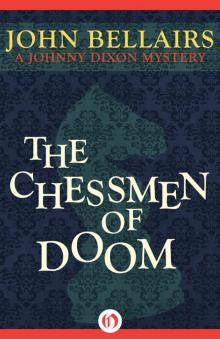 Chessmen of Doom
Chessmen of Doom Secret of the Underground Room
Secret of the Underground Room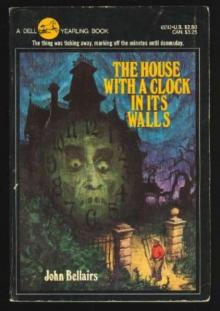 The House With a Clock in Its Walls
The House With a Clock in Its Walls The Vengeance of the Witch-Finder
The Vengeance of the Witch-Finder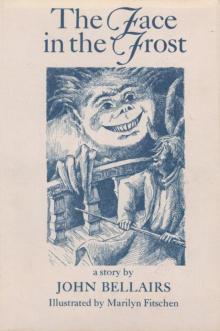 The Face in the Frost
The Face in the Frost Revenge of the Wizard's Ghost
Revenge of the Wizard's Ghost Spell of the Sorcerer's Skull
Spell of the Sorcerer's Skull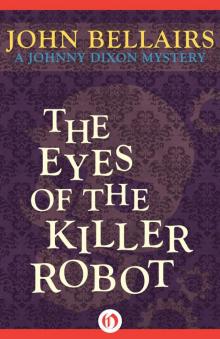 Eyes of the Killer Robot
Eyes of the Killer Robot Mummy, the Will, and the Crypt
Mummy, the Will, and the Crypt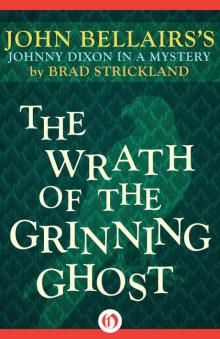 Wrath of the Grinning Ghost
Wrath of the Grinning Ghost The Mansion in the Mist
The Mansion in the Mist The Doom of the Haunted Opera
The Doom of the Haunted Opera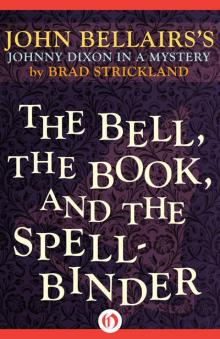 The Bell, the Book, and the Spellbinder
The Bell, the Book, and the Spellbinder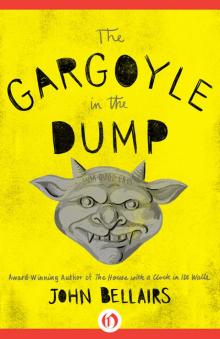 The Gargoyle in the Dump
The Gargoyle in the Dump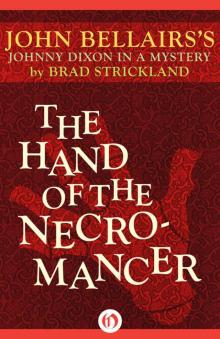 The Hand of the Necromancer
The Hand of the Necromancer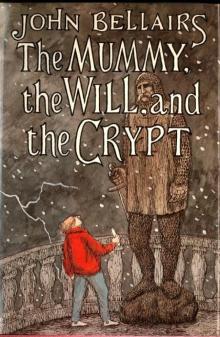 The Mummy, the Will, and the Crypt
The Mummy, the Will, and the Crypt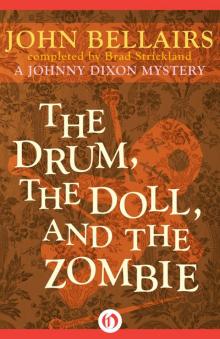 Drum, the Doll, and the Zombie
Drum, the Doll, and the Zombie The Specter from the Magician's Museum
The Specter from the Magician's Museum The Letter, the Witch, and the Ring
The Letter, the Witch, and the Ring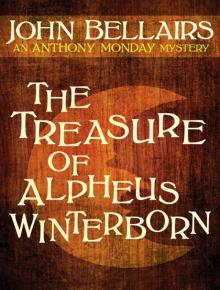 The Treasure of Alpheus Winterborn
The Treasure of Alpheus Winterborn The Dark Secret of Weatherend
The Dark Secret of Weatherend The Figure in the Shadows
The Figure in the Shadows